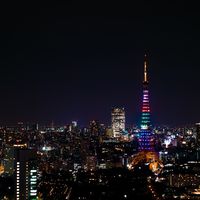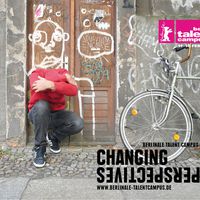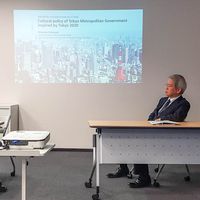Inspiring Tokyo. Culture, Innovation and Internationalisation
 [caption id="attachment_46365" align="aligncenter" width="550"]
[caption id="attachment_46365" align="aligncenter" width="550"]November is one of the best months to visit Tokyo and one of the most intensive and exciting for its cultural and artistic activities.
Pushed, on one hand, by the need to extend cultural bridges and internationalise its collaborations and activities and, on the other hand, by the strong pressure to envisage and shape the Tokyo 2020 Olympic and Paralympic Games, the Tokyo Metropolitan Government has organized – through its cultural arm, the TCCP, Tokyo Culture Creation Project – a very inspiring and stimulating Conference and International Visitors Program.
In its fourth edition, held in the capital city of Japan between November 6th and 15th, the TCCP and its partners have developed a very intensive program that began with the international Conference titled “Culture and Social Innovation: Cities of Cultural Creativity and Festivals”.
The conference, held as one of the events that mark the 20th anniversary of Tokyo-Berlin city partnership, was mainly focused on the issue of Festivals, their significance in cities and their contribution to cultural development. Some of the questions addressed, analysed and discussed during the conference were: What is the significance of holding festivals in cities in this modern 21st century world? What is the new value that is generated from festivals? What is the significance of festivals for the residents of a city? What is expected of the cultural policies and projects of local governments in the organization and support of festivals? What kind of festivals do we need in Tokyo from now on?
In the opening address, Mr. Kohei Torita, from The Tokyo Metropolitan Government, confirmed that the conference aimed to strengthen international cooperation and that the local institutions were meant to make Tokyo internationally renowned for art and culture. The city of Berlin co-hosted the event and Dr. Konrad Schmidt-Werthern, Head of the Department of Culture in the Senate Chancellery in Berlin, emphasised that many international artists choose to live and create in the cities of Tokyo and Berlin, stressing how artistic stimulus is essential to renovate societies.
The first keynote speech by Dr. Thomas Oberender, Artistic and Managing Director of Berliner Festspiele, addressed the origin, the character and the social contexts of festivals. Talking about several examples in history, from religious to cultural festivals, and about distinctions regarding sizes and contexts related to small or big cities, Dr. Oberender said that at the core of festivals we find the circulation of artworks and the creation of temporary communities. According to him, festivals create a different experience of art: on the one hand they provide the “extraordinary”, on the other hand they build the community. Festivals are continuous exceptions to the general rule, serve self-assurance and are network nodes. Another interesting point offered by Dr. Oberender was that festivals interact with traditional infrastructures and complete them. As one of his last remarks, the Director of Berliner Festspiele defined the 4 “i” of Festivalisation: internationality, intermediality, interculturality and interdisciplinarity.
The second keynote speech, delivered by Ms. Eriko Osaka, Director of Yokohama Art Museum, focused on a timeline of art biennales and triennales, highlighting the growth of these events in Asia in the last decades. In her presentation Ms. Osaka offered a general overview of the international contemporary art festivals and, more specifically, the evolution and expansion of Japanese biennials, triennials and art festivals. The change in the topography of contemporary art - which now sees Asia as a major player for art events – came along with a fast economical development in Asian countries. According to her discourse, contemporary art improves the quality of life and society through the power of creativity and imagination.
In the panel discussion, several international guest speakers debated, among other issues, the importance of arts for cities development; the role of festivals to make cities more attractive; the role of art and culture within the Olympic games; and the way how governments and local institutions think about festivals as opportunities for cultural, social and urban development.
Louise Jeffreys, Director of Arts at the Barbican Centre in London, talked about her experience of connecting the Barbican to the Cultural Olympiad in 2012. She stressed 5 key points that were essential for the vision and development of the international programme of the Cultural Olympiad: Quality, Local & Global, Partnership, Generosity and Legacy.
The presentation of Mihye Lim, from the Seoul Foundation for Arts and Culture, provided a general overview about how the government and local institutions in South Korea are investing hugely in art and culture. Economic growth, arts and creativity development, the improvement of the cultural life and togetherness in megacities like Seoul, are some of the goals of the current South-Korean cultural policy.
Yusuke Hashimoto, Program Director of Kyoto Experiment, talked about the last edition of the International Performing Arts Festival in Kyoto and stressed how one of the main aims of this event is to refresh the cultural identity of the city. Katsunori Miyoshi, Director General of Arts Council Tokyo, presented some of the activities of the public institutions he represents and described the Tokyo’s cultural resources. Mr. Moyoshi talked about specific events like the Roppongi Art Nights, and explained how the Arts Council Tokyo provides grants and support to artists and cultural professionals.
The conference represented a significant opportunity to discuss different values and to compare different cultural mechanisms at international level. Issues like access to culture, the role of art and culture within the different communities, the question of participation, the concern of funding, the intrinsic risks of festivals – that are often considered insecure structures – as well as the role, position and responsibility of the artists and the different cultural professionals, were taken into account during the discussion. Unfortunately a very short time was left for the audience and the discussion would have been surely richer with a greater involvement of the cultural professionals who attended the event.
In any case, what is most important is to stress how thinking together, sharing opinions, identifying areas of common interest, and strengthening international relationships are all essential keywords and goals in order to build a solid critical knowledge and shape the future of cultural collaboration.
The efforts of Tokyo and its local cultural institutions should go in this direction and make the best of its cultural investments in order to open up and maintain a space for international and constructive discussions and exchanges.
Useful links:
- Tokyo Conference 2014: http://www.bh-project.jp/en/search/tabid/339/Default.aspx
- Tokyo Culture Creation Project: http://www.bh-project.jp/en/tabid/78/Default.aspx
- Arts Council Tokyo: http://www.artscouncil-tokyo.jp/en/
- Tokyo Metropolitan Foundation for History and Culture: http://www.rekibun.or.jp/english/
- Berliner Festspiele - https://www.berlinerfestspiele.de/
- Yokohama Art Museum - http://yokohama.art.museum/eng/
- Barbican Centre - www.barbican.org.uk/
- Seoul Foundation for Arts and Culture - english.sfac.or.kr/
- Kyoto Experiment - http://kyoto-ex.jp/2014-eng/
Similar content
07 Feb 2019
posted on
08 Nov 2011
24 Nov 2015 - 24 Nov 2015
posted on
06 Jul 2011
03 Dec 2018




